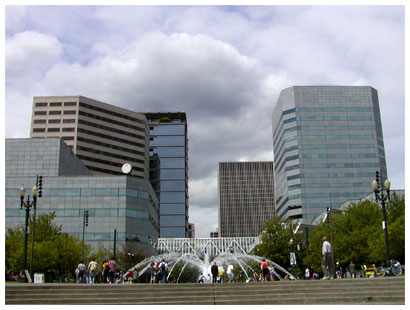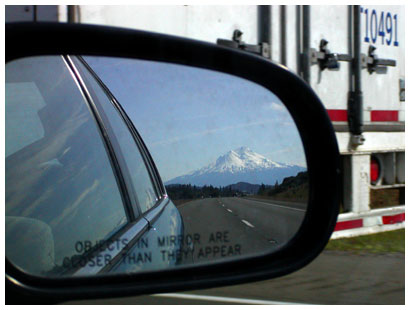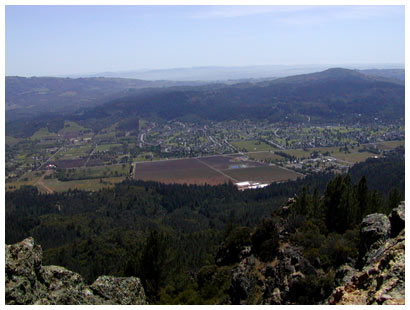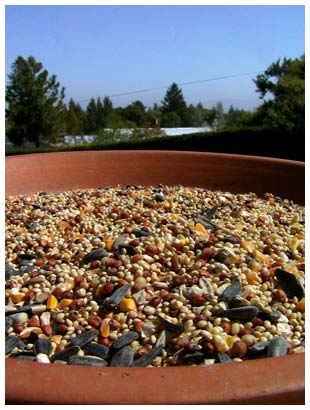NYC Bloggers is mapping the location of bloggers in New York. Their mapping system is impressive. [via Blogger] Blogging has a lot in common with other forms of Internet communications that came before: usenet, IRC/instant messaging, etc. But I think local geographic-based organization is something completely unique to weblogs. It's funny that a global communications tool is connecting people who live down the street from each other. It's also inspiring.
Posts from May 2002
I'll be gone and off the grid for a few days. I should be back with lots of snapshots.
Another view of Mt. Shasta



An iris farm south of Portland
We spent Sunday in Portland. We started and ended the day at Powell's Books. It's three stories and an entire city-block of books. I could have spent the whole day browsing there. There are other specialty Powell's stores around Portland: cooking, technical, and travel. (It's not the only game in town, though, because we saw quite a few book stores.) We spent the rest of the day walking around the city. It was a very nice time with beautiful weather. I'm looking forward to visiting Portland again. I took a bunch of pictures. I hope you like buildings.

more >>
The painted cows in a few of the pictures are part of the CowParade project.

more >>
The painted cows in a few of the pictures are part of the CowParade project.
skp and I went to Oregon over the holiday weekend. We had a great time, though it was a lot of time to spend in the car. I'd never been to Oregon before so I was surprised that you can't pump your own gas. You'd think that would make the gas more expensive, but compared with California's prices Oregon gas was cheap. Oh, and no sales tax was nice.

mt. shasta from highway 5
Like Jason, I was impressed by Clay Shirky's analysis of the LiveJournal community. Especially his findings about groups of 12 and how they allow people to have a satisfying experience. Since then, I've been noticing groups of twelve. Maybe it's a natural way to organize. I tried to come up with a list of famous 12's.
Now the question is, how do you build community software that accommodates groups of 12, and encourages that equilibrium point? And how can the whole community scale (another great article on the subject by Clay Shirky) without loosing their individual group identities?
Are there other famous 12s?
- 12 apostles in Christianity
- 12 causes of samsara in Buddhism
- 12 tribes of Israel in Judaism
- 12 people on a jury
- 12 months in a year
- 12 signs in the zodiac
- 12 original American colonies (ok, 13 if you count Delaware)
- 12 days of Christmas
- 12 tone musical scale
- 12-sided snow crystal
- 12 immortals in Greek Mythology
- 12 beers in a 12-pack
Now the question is, how do you build community software that accommodates groups of 12, and encourages that equilibrium point? And how can the whole community scale (another great article on the subject by Clay Shirky) without loosing their individual group identities?
Are there other famous 12s?
PR Watch: Spinning the Web: "Some PR firms have also planted ringers in online chat rooms--paid consultants who defend their clients while concealing their financial ties to the company being discussed. 'A small industry is emerging among consultants who specialize in spinning online discussions to favor the positions of companies and interest groups,' the New York Times reported in October 1999. Audrie Krause, for example, works as a consultant for AT&T but has represented herself online as a 'consumer advocate' during discussions of broadband Internet access, a subject in which AT&T has a vested interest."
I think identity literacy and skepticism without disclosure are going to be important as PR firms use the Web more and more in an attempt to manage perception about issues and companies. The balance between privacy and disclosure is difficult, and hopefully online community developers can find ways to make it easier.
Anyway, the article quoted above shows how PR firms view the Web; both as a threat and an opportunity.
I think identity literacy and skepticism without disclosure are going to be important as PR firms use the Web more and more in an attempt to manage perception about issues and companies. The balance between privacy and disclosure is difficult, and hopefully online community developers can find ways to make it easier.
Anyway, the article quoted above shows how PR firms view the Web; both as a threat and an opportunity.
From my backyard this morning:


I just realized this page has gone all text. Usually I have a few pictures up. I've been busy, though, and haven't had a chance to get out with my camera. Hopefully I'll have time this weekend. (going on a road trip.) I've been bad about email too. It's not you—it's me.
There should be a special word for that mix of anger and disappointment you feel when you loose five hours worth of development time because of a computer crash. Heads-up: Visual Basic 6 doesn't have any sort of auto-save, so if you cause an infinite loop–your program will regress to your last saved point. And you will swear. Loudly.
Silent Theft by David Bollier looks like an interesting companion to Lawrence Lessig's The Future of Ideas. It's more about the plundering of the commonwealth through absurd patent and copyright laws. David Bollier opens the book with this nursery rhyme:
They hang the man and flog the woman
That steal the goose from off the common.
But let the greater villain loose
That steals the common from the goose.
They hang the man and flog the woman
That steal the goose from off the common.
But let the greater villain loose
That steals the common from the goose.
'Copy-Proof' CDs Cracked with 99-Cent Marker Pen: "Technology buffs have cracked music publishing giant Sony Music's elaborate disc copy-protection technology with a decidedly low-tech method: scribbling around the rim of a disk with a felt-tip marker."
It would also be great if conferences would make a list of every book mentioned in every talk. There were so many mentioned over the past few days, and I didn't get them written down. I remember Building Secure Software by Viega and McGraw, but that's it. At Lawrence Lessig's panel discussion yesterday, someone (David Henkel-Wallace, I think) mentioned a certain book as "the one thing you should read tomorrow to help fight outrageous copyright laws." (or something like that.) But I can't remember the book he mentioned. Anyone?
(This is another good reason to have a centralized note-swapping space.)
(This is another good reason to have a centralized note-swapping space.)
Some ideas from the conference that I'd like to jot down for safe keeping:
- As software companies are held more and more accountable for problems in their code, insurance companies may take over parts of the design process or set standards. (think underwriter's laboratories, which was set up to provide safer electrical equipment.) [related presentation slides.]
- As the technology industry matures, the problems become less technical problems and more human problems.
- Dan Gillmore's phrase The Former Audience kept recurring. Cory mentioned it on his site. It's a great way to explain the effect that weblogs and other collaborative communication technologies are having.
- The idea of copyright has been ingrained in everyone, and it's easy to understand. The idea of a thriving public domain has not been ingrained in everyone. There is a need for great metaphors and stories here so that it's easy to explain why a public domain is necessary for creativity. People should be debating it. Paul's Boutique couldn't be made today (without a thousand lawyers working around the clock). I want another CD like that...or I should be able to make a CD like that. I should be able to sample my culture.
- Unfortunately, I'm beginning to wonder if in the near future, the only place innovation can happen is inside large corporations. They will be able to absorb the costs related to patents, copyright, and insurance standards while smaller companies will simply be litigated out of business. And, of course, disruptive technologies like the personal computer or Napster would never have been released from a big company because it interferes with the existing system of doing business.
- Wireless technology will become ubiquitous, and hack the spaces that big companies won't provide high speed access to. And it's not because any company is pushing it or spearheading it. (It's not happening in the way companies have previously envisioned, anyway.)
- Tim O'Reilly's question: Are webloggers building a city, or living in their own ghetto? [mentioned in Rob Flickenger's EtherPeg article.]
I'm home from the conference. It was a great experience, and I can tell it's going to take a while to digest all of the ideas I heard over the past two days.
I'm just sick that I'm missing the Emerging Technology Conference because I'm sick. I'm feeling better though, and I think I'm finally past the contagious stage. I'll be there tomorrow. Meanwhile I've been living vicariously through Wes and Cory's live updates. Is anyone else blogging from the conference?
This makes me think conferences should set up a simple Web Service that bloggers could ping to let the conference know they've written something related. In fact, a method for sending/receiving weblog posts would make this simple; and publishing tools could build it into their interface. You'd just enter the URLs of the services you want to notify, and choose from a list as you post—if what you're saying relates to the subject of the service. Then attendees (or absentees like me) could get a list of the distributed conversations happening about a conference at the conference site itself. This would be handy for aggregating topic-specific discussions as well. You'd just set up a server and say, "ping this URL whenever you talk about [your favorite subject]." Let's call this a Distributed Conversation Server. I'll get right to work on that.
Update: They have pointers to some weblog coverage.
This makes me think conferences should set up a simple Web Service that bloggers could ping to let the conference know they've written something related. In fact, a method for sending/receiving weblog posts would make this simple; and publishing tools could build it into their interface. You'd just enter the URLs of the services you want to notify, and choose from a list as you post—if what you're saying relates to the subject of the service. Then attendees (or absentees like me) could get a list of the distributed conversations happening about a conference at the conference site itself. This would be handy for aggregating topic-specific discussions as well. You'd just set up a server and say, "ping this URL whenever you talk about [your favorite subject]." Let's call this a Distributed Conversation Server. I'll get right to work on that.
Update: They have pointers to some weblog coverage.
being sick on a beautiful weekend like this is frustrating. And just to drive the frustration home, one of my favorite bands, Ozomatli, is giving a free concert at Sonoma State University today.
Other corporations could learn a lot from Macromedia. When their actions were (kindly) criticized by a few weblogs, they had an immediate platform to respond. Because they have weblogs themselves, they are involved in the community, and Mike Chambers responded to my comments with clarifying information right here. Most corporations who want to respond to criticism would still be discussing what kind of press release they're going to write, if they were even tuned in at all.
Stephen Johnson mentioned the Weblog Bookwatch in an article at Salon: Use the blog, Luke: He calls it "An interesting corrective to ordinary bestseller lists, in that it measures which books get talked about, rather than which ones get bought." I couldn't agree more. You may remember him as the author of such books as Emergence (currently on the Weblog Bookwatch Top 10) and Interface Culture. He'll be speaking at eTech next Wednesday.
Macromedia Vice President to employees: blog or you're fired. It'll be interesting to see how "the blog strategy" works out for them. Can someone sustain an interesting weblog if they're compelled to do it as part of their company's developer relations strategy?
And it seems the strategy has a few problems. Meg points out: "Passing off a 'work' site as a truly personal site when it's obviously not...can be misleading to its readers." Transparency and honesty are key pieces of personal opinion weblogs like these. Also, Matt notes that they're on the right track, but the content restrictions show they "...don't trust their employees to be human in a corporate setting."
And it seems the strategy has a few problems. Meg points out: "Passing off a 'work' site as a truly personal site when it's obviously not...can be misleading to its readers." Transparency and honesty are key pieces of personal opinion weblogs like these. Also, Matt notes that they're on the right track, but the content restrictions show they "...don't trust their employees to be human in a corporate setting."
You learn some interesting things in spam. Evite.com is wholly owned by Ticketmaster. TMCS also owns Citysearch.com and Match.com. (It cost me an extra $12 just to mention them in this post.)
"There is no such thing as writer's block. There is only failure to make a decision." - Michael Bremer quoting one of his writing professors in UnTechnical Writing. I can't decide if I agree. Maybe that's the first decision I need to make.
If you administer Windows 2000 servers, you might want to check out their new Baseline Security Analyzer. It will scan for missing hotfixes and known vulnerabilities and return XML reports about the machine. (Conveniently translated to HTML for easy reading.) It also checks out the security status of SQL Server 7.0+.
I'm guilty of using javascript: in my hrefs. Scott's rant has changed my ways.
Meg has some great advice for working with clients in her latest O'Reilly article. Having a review process can take the personal politics out of project decisions. And it's another reason why persona-based design decisions are better than the results of an internal battle-of-wills.
Went for another spectacular hike this weekend. Mt. Hood in Sugarloaf State Park near Santa Rosa is a tough hike, but the views all the way up are worth it. It was very hot, but we found a cool spot next to a waterfall for lunch.

a great lunch spot
We all agreed that if we could teleport to a location for lunch every day, that would be the spot. Very relaxing.

view from gunsight rock
We didn't know this at the time, but there's a geocache at the top. Those geocachers are everywhere.

a great lunch spot
We all agreed that if we could teleport to a location for lunch every day, that would be the spot. Very relaxing.

view from gunsight rock
We didn't know this at the time, but there's a geocache at the top. Those geocachers are everywhere.
Finally, finally, finally I'm free from the incompetent boobery of Network Solutions/Verisign. This domain has been transferred to another registrar. (I use register.com.) I've been wanting to do it for a long time, but I'd heard horror stories about the registrar transfer process. Luckily, transferring was a breeze.
Based on Verisign's stock, it looks like the title of Internet Capital is being taken away from Virginia. That story from 1999 shows they've always been clueless: "'Virginia is the home of the Internet, and we are the leaders of this historic business revolution,' said Mike Daniels, chairman of domain registrar Network Solutions..."
This link describes an instance of domain hijacking/re-selling thanks to the incompetence of Verisign. This sort of thing should be illegal if it isn't already, but I guess you can get away with it when you live in the Internet Capital. Security is all about trust, and instilling trust doesn't seem to be their core competency.
Based on Verisign's stock, it looks like the title of Internet Capital is being taken away from Virginia. That story from 1999 shows they've always been clueless: "'Virginia is the home of the Internet, and we are the leaders of this historic business revolution,' said Mike Daniels, chairman of domain registrar Network Solutions..."
This link describes an instance of domain hijacking/re-selling thanks to the incompetence of Verisign. This sort of thing should be illegal if it isn't already, but I guess you can get away with it when you live in the Internet Capital. Security is all about trust, and instilling trust doesn't seem to be their core competency.
